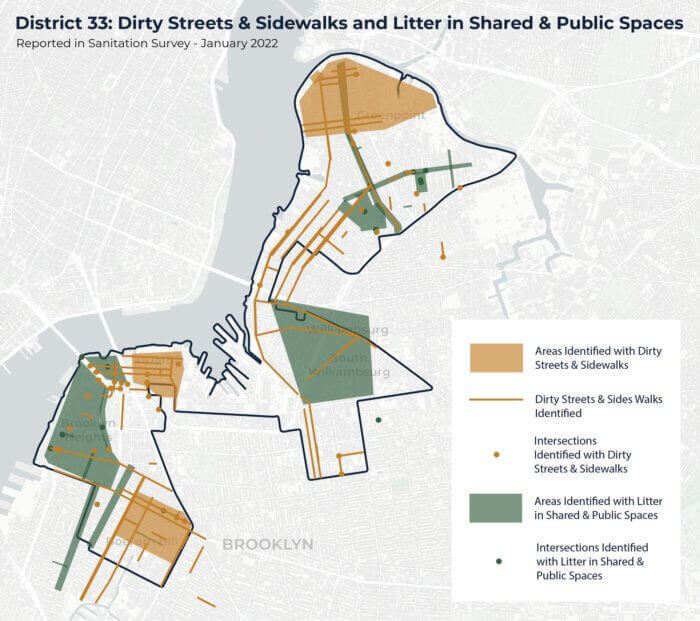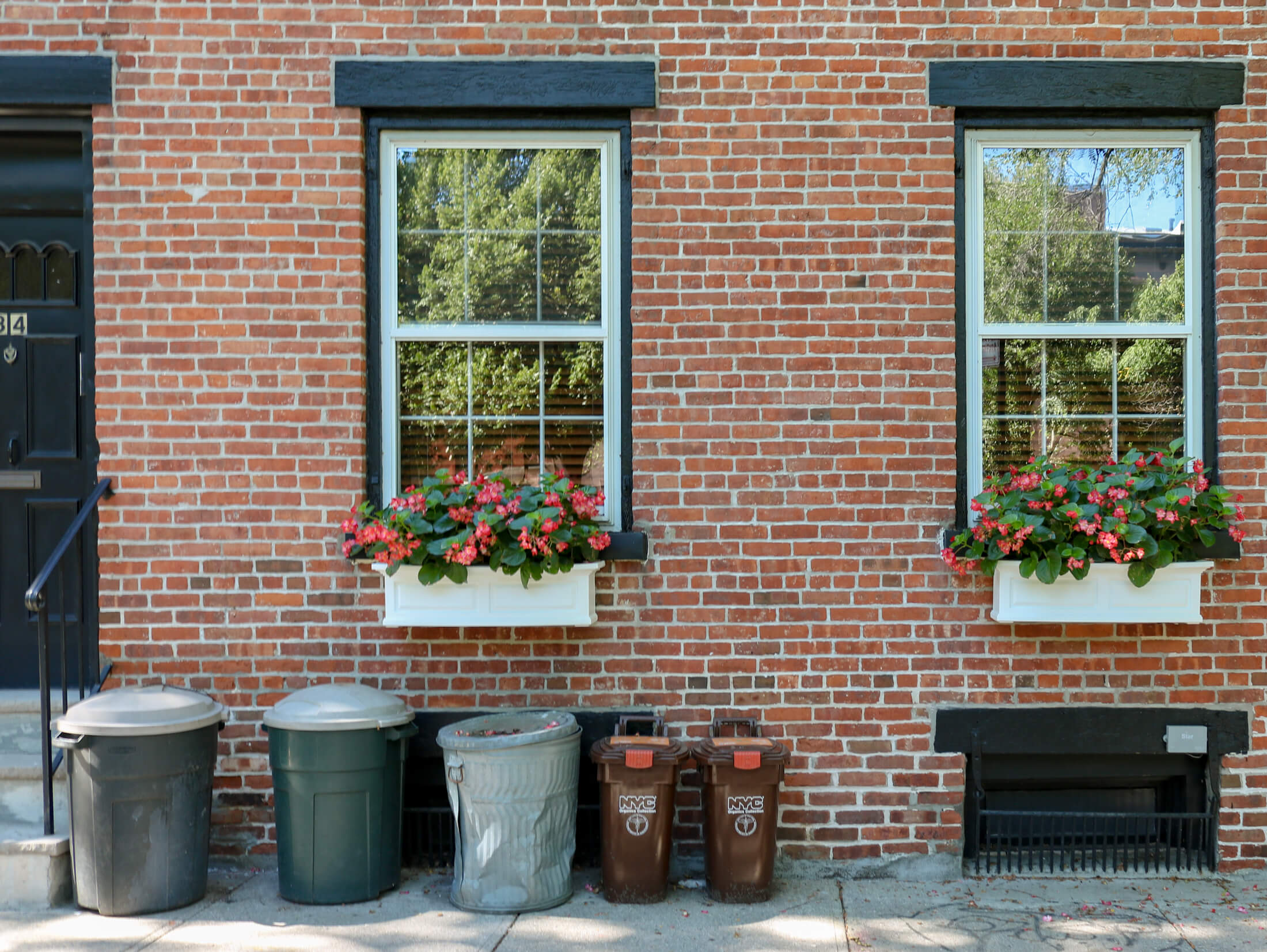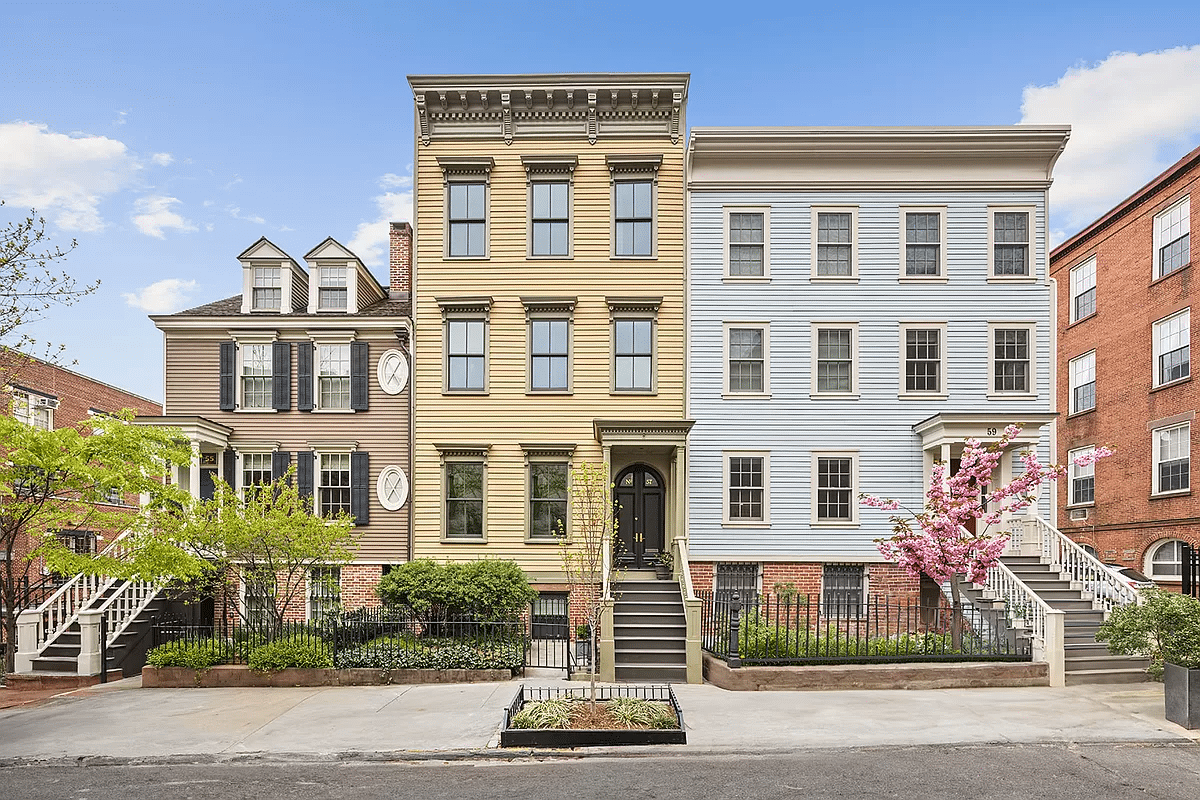Fed Up With Litter, Rats, Locals Inspire Compost-Focused Cleanup Plan From Gowanus to Greenpoint
Council Member Lincoln Restler has announced a Community Cleanup Plan for his North Brooklyn nabes after sending out a district-wide survey on his constituents’ sanitation concerns.

Greenpoint. Photo by Susan De Vries
Council Member Lincoln Restler has announced a Community Cleanup Plan for his North Brooklyn nabes after sending out a district-wide survey on his constituents’ sanitation concerns.
Nearly 300 residents of Restler’s District 33, which extends from Greenpoint to parts of Carroll Gardens and Gowanus, replied to the survey, checking off their primary issues regarding the cleanliness of their neighborhood.
About 30 percent of respondents said their top issue was dirty streets and sidewalks, followed closely by nearly 17 percent who feel they see too many rats in the neighborhood, 15 percent who hate the sight of overflowing public trash cans, and 11 percent who want littering in public spaces to be curbed.
Those responses — along with additional complaints like illegal dumping, trash bags blocking public spaces, and the desire for trash containers — shaped an eight-point plan developed by the councilmember’s office and the city’s Department of Sanitation.

Plans include addressing the rat problem by increasing participation in the city’s composting program, which would remove the tasty morsels rats search for in sidewalk trash bags and bins; purchasing new, rat-proof public trash cans and seeking to enroll local businesses in an “Adopt-a-Basket” program to ensure they get emptied more frequently; calling for the mayor’s office to restore full funding to the sanitation department; and placing cameras in locations frequently used as illegal dumping grounds.
“It’s past time that we get serious about cleaning up the 33rd,” Restler said, in a statement. “Sanitation problems impact the quality of life of everyone in our community. Nobody wants garbage bags blocking their sidewalk or overflowing litter baskets that attract rats in their neighborhood. We’re getting to work implementing our Community Cleanup Plan to make every neighborhood in the 33rd cleaner and healthier.”
While each of the three community boards represents reported high numbers of acceptably clean streets in 2017, the most recent year reported in the city’s district profiles, sanitation concerns appear in each of their budget request reports for the upcoming fiscal year.
Community Board 2, which includes Downtown Brooklyn, Brooklyn Heights, Clinton Hill, and the Navy Yard, noted a need for better sanitation services in their 2023 budget requests, especially outside of school buildings.
“Walk by any school after 4 p.m. and you will see mounds of trash collected and deposited on [the] curbside. Some of it is cafeteria waste which worsens the rat problem since the trash is packed in plastic bags, not containers,” the board wrote in their needs statement. “Additionally, when school trash piles up, additional dumping by non-school people worsens the situation.”
Restler’s cleanup plan also plans to pursue a “containerization” program, implementing secure curbside trash collection containers rather than leaving trash outside in flimsy plastic bags.

A Clean Curbs pilot program, which would install those containers outside some businesses, has been in the works for two years, but no containers have been installed. When the program does launch, it is likely to be very limited in scope.
In Community Board 6, the board asked for the city to increase funding for weekly litter collection so public wastebaskets, especially on busy commercial corridors, could be emptied twice a week. Both CB2 and Community Board 1 noted a need for stricter enforcement against illegal dumping, especially beneath the Brooklyn-Queens Expressway.
“Council Member Restler’s survey and responses are indicative of the same concerns expressed by nearly every single council member and show the extraordinary need to baseline collection and litter basket services in DSNY’s budget,” said neighboring Council Member Sandy Nurse, chair of the Council’s Committee on Sanitation and Solid Waste Management. “Our communities want clean streets and they want to see NYC investing in sustainability programs like curbside composting. I know the administration hears these concerns and I am hopeful they will be reflected in a final budget.”
In his preliminary budget, Mayor Eric Adams proposed halting the expansion of curbside compost pickup, calling the program “broken” and said he wanted to improve it.
The proposed budget also slashes spending across city agencies, including DSNY, drawing criticism from Nurse, who said during a committee hearing last month that the department is already struggling with staffing and budget cuts.
A report issued by state Comptroller Thomas DiNapoli said that the city’s sanitation department — the largest in the world — was understaffed and relying heavily on overtime. The department projected spending up to $300 million on overtime pay in fiscal year 2022.
Editor’s note: A version of this story originally ran in Brooklyn Paper. Click here to see the original story.
Related Stories
- CB6 Neighborhoods Will Be the First to See the Return of Curbside Organics Pickup Next Week
- In ‘Burg, Police, Sanitation Toss Beds, Tents in Trash as Homeless Say Group Shelters Are Unsafe
- NYCHA Residents in Coney Island Deal With Seven Months Without Gas and No Timeline for Its Return
Email tips@brownstoner.com with further comments, questions or tips. Follow Brownstoner on Twitter and Instagram, and like us on Facebook.








What's Your Take? Leave a Comment